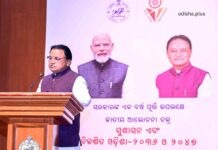by Prof Ujjwal K Chowdhury

Bengal politics is on the boil on the slogan of Jai Shree Ram by the BJP and its bitter on-streets opposition by Chief Minister Mamata Banerjee and her street-fighters. The adamant victory rallies being carried out by the BJP over the last fortnight in spite of restrictions by police, and violent skirmishes between BJP and Trinamool (TMC) have led to a situation of unabated violence where BJP claims around 54 cadres killed and TMC says some 19 killed over the last three months.
The politics and development of a hundred million Indians in the state are being clouded and usurped by a for-the-camera concocted issue of Jai Shree Ram of BJP versus Jai Bangla Jai Hind of TMC, none of which are wrong slogans if seen in isolation and need not be opposed by either party.
Hiring Prashant Kishor as political consultant and launching Jai Hind Vahini and Banga Janani Vahini, apart from creating Bengali Pride & Culture narrative against Jai Shree Ram, Mamata Banerjee is taking the battle to the next level. And launching Jai Ma Kaali slogn along with Jai Shree Ram, BJP is completing its quest exclusively targeting the Bengali Hindu voters.
Let us have a historical context here
Considering Congress as the B-Team of CPI(M) during the nearly four decades long Left Front rule in Bengal, Mamata Banerjee, the firebrand Congress leader of the 1980s, left Congress and formed Trinamul Congress (Grassroots Congress, TMC), and led a bitter struggle against the Left Front, which had grown authoritarian and even anti-people in the first decade after 2000. Being beaten on the streets and at the hustings, several times, Mamata finally came to power in 2011, and took oath on open Red Road with a few lacs people in front. It was an electoral success for the Parivartan (Change) movement she led, especially after the debacle of CPI(M) in Singur and Nandigram, where farmers’ lands were being taken for corporate use much to the chagrin of the peasants.

However, on assuming power, Mamata on one hand brought in a slew of pro-people measures like Kanyashree (girl-child education), Sabuj Sathi (rural ecology protection), Swasthya Mitra (public health upgradation), urban modernization in Kolkata and Siliguri, etc, and on the other, she ruthlessly suppressed the Naxal forces and CPI(M) lower rungs. TMC took over several Left party offices and Mamata govt filed cases at random on the Left activists. Thousands of lower rung Left supporters, largely the local hoodlums with cases against them, often called the ‘Harmad Vahini’ by local people, switched sides, joined TMC to have protection and continued political patronage. This continued all across her first tenure till 2016. With development and strong arm tactics together, she managed to win with a higher vote and seat share in the Assembly in 2016.
The violence unleashed on the opposition cadre, specially of the Left forces, in spite of several pro-people measures of TMC government, led to an exodus of a large number of political activists of the opposition in Bengal towards BJP in the last two to three years. If we go by the results of the just concluded Lok Sabha polls, TMC has got 22 seats in place of 34 earlier but yet increased its vote share by 4.5%, from 39 to 43.5%, and hence protected its vote-share, which has almost entire Muslim voters and a good part of Hindu voters too. But CPI (M) and Congress have heavily lost votes to BJP which has touched 40% and got 18 seats in Bengal. So, it is not religious polarization, but political re-alignment due to the history of violent politics of TMC on one hand, coupled with the politics of money, muscle-power and religious imagery by BJP.
Alongside, BJP is spearheading a violent entry into Bengal politics led by two former trusted TMC leaders, Mukul Roy (Sarada scam accused) and Arjun Singh (former TMC MLA against whom BJP once led movements in Bhatpara). BJP, instead of giving any alternative vision for Bengal, is just banking on Hindu polarization in its favour, and using the veiled threat of Article 356 calling for President’s Rule if constitutional machinery of the state breaks down due to unabated violence in Bengal. An impression is being created across national media now that it is just a question of time that Mamata will be unseated.

However, Mamata Banerjee and her TMC, with around 75% MLAs of Bengal assembly, with 43.5% voters’ latest support amid bedlam and chaos, and with organization apparatus, good or bad, in every village and township of Bengal, cannot be written off. While there is correctly much talk about the BJP being the beneficiary of the attrition of votes from the anti-Mamata opposition, particularly the large tribal vote bank of the Left and sections of the Dalits as well, political observers tend to ignore that the Trinamool Congress, too, is gaining from the collapse of the traditional Opposition in West Bengal. For instance, the Muslim minority vote, 55 per cent of which is estimated by a post-poll survey by the Centre for Study of Developing Societies (CSDS) to have voted for the Congress and the Left in 2014, has en masse defected to the Trinamool Congress, which is now seen as the only bulwark against the Hindutva campaign of a rampaging BJP. Significantly, compared to only 20 to 22 of 294 assembly seats where the tribal vote is a deciding factor, the Muslim vote may clinch the outcome in three times that number.
It must also be noted that the BJP currently does not have organizational structure and offices in a large number of villages and towns of Bengal, especially in South Bengal. The party is solely dependent on the charisma of PM Modi and political acumen of Amit Shah to win here. The local leadership of BJP is sharply divided among three camps: old guard like Rahul Sinha, RSS recruits like state BJP president Dileep Ghosh, and TMC turncoats like Mukul Roy and Arjun Singh (who also have a history of conflict between them while in TMC). With assembly elections less than two years away, Bengal and the BJP’s ambitions for it, is sure to assume centre-stage. But what aided BJP in Bengal was the consolidation of the opposition vote-share. The Left voters, irrespective of Leftist hardline ideology, took a sharp Right with BJP improving its vote-share from 17 per cent in 2014 to close to 40%. This increase has come at the cost of the decline of the Left Front that languishes at 7 per cent vote-share; CPI(M) at a dismal 3 per cent.

The deep-seated anger of the Left and dangerous desire to bring down TMC, much like the former did to the Left Front, is at the crux of the BJP’s victory in Bengal. ‘An enemy’s enemy is a friend’ is the ‘dharma’ followed by Left Front voters; and not even a former chief minister and CPI(M) stalwart, Buddhadeb Bhattacharjee’s impassioned appeal to them could have made a difference.
However, this may not be the case ahead. Left voters may again consolidate, with a back-hand support from Mamata herself. Congress may actually join hands with her with the talks to unite former Congressmen (and women) in to the party (and Mamata is an illustrious one at that). Chances of Congress and TMC getting into an alliance formally, and informally supporting the Left in some seats for the Assembly polls is a possibility, and perhaps a need for TMC. And this may change the game.
To write-off Mamata Banerjee at this stage would be a fallacy. An astute politician, she is known to bounce back. Congress underestimated her when they felt she wouldn’t leave the party-fold. Left underestimated her years of street-fighting and confrontational politics. Today, her naysayers are underestimating her once again; writing her epitaph a bit too soon. With 22 Lok Sabha seats, TMC is still comfortably leading in 164 of the 294 assembly seats. What Mamata needs to do is not to fall into the BJP’s game-plan or trap. Respond to Jai Shree Ram of BJP with your own Jai Hind, Jai Bangla. Do not fall victim of a vicious trolling campaign by the BJP through slogans, post-cards and heckling without any resort to an alternative development agenda for Bengal.

TMC must respond to attempts to polarization by BJP, to their own campaign around benefits of myriad government schemes and measures for the majoritarian community (as much or more than the minorities). Respond to allegations of Muslim appeasement against TMC, with evidences of Imam stipend from Wakf Board income, and support given by TMC to Hindu festivals also. Respond to BJP’s North Indian Hindutva rhetoric with the traditional synthetic Hindu-Muslim Bengali culture, music, literature, dances and history. Respond to BJP’s attempts towards saffronization with TMC’s focus on multi-cultural Bengal and the economic failures of the Centre and development measures of Bengal. The rise of the State GDP, inflow of investments in Bengal, rise of social entrepreneurship, and overall public health and education situation need to be the focus of TMC. And its leadership must be much chastened, much focused, much calmer.
And finally, if BJP led Central government finally imposes President’s Rule, it will make Mamata a political martyr of sorts.
The author is a noted media academic, columnist and participant in TV debates.


























